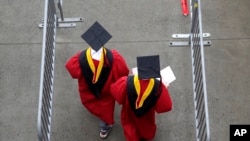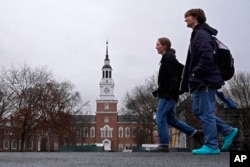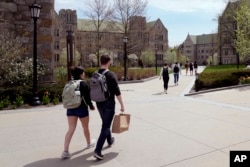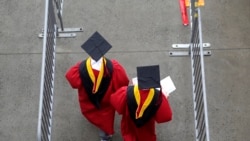A new study says that Americans have increasing questions about the value and cost of a college education. Most of the people taking part in the study felt that higher education in the U.S. is headed in the “wrong direction.”
Gallup and the Lumina Foundation carried out the study. It found that only 36 percent of adults said they had a “great deal” or “quite a lot” of confidence in higher education.
That confidence level has decreased steadily from 57 percent in 2015. That was the first year in which Gallup measured confidence in higher education.
The decline is seen in all subgroups of people including sex, age, and political ties. Among Republican Party members in the study, the number of people with high confidence in higher education has dropped 36 percentage points over the last 10 years. That is far more than for Democratic Party members or independents.
Some of the opinions in the study might show concerns about the high cost of college and how race and other subjects are taught.
Fifty-nine-year-old Randy Hill is a registered Republican in Connecticut and a driver for a car service. He told the Associated Press, “It’s so expensive, and I don’t think colleges are teaching people what they need to get a job.” Hill said his nephew plans to do a welding apprenticeship after high school instead of going to college.
The June 2024 study found that 36 percent of adults feel strong confidence in higher education. That percentage is unchanged from the year before.
But the researchers said they were concerned that fewer Americans were saying that they had “some” confidence, and more were reporting “very little” or “none.” This year’s findings show almost as many people have little or no confidence, 32 percent, as those with high confidence.
Experts say that fewer college graduates could worsen labor shortages in fields from health care to information technology. For those who do not go to college, it often means lower lifetime earnings.
Georgetown University’s Center on Education and the Workforce said lifetime earnings for those without a bachelor’s degree could be 75 percent less than for those with a degree. The center also said that during an economic downturn, those without college degrees are more likely to lose their jobs.
Courtney Brown is a vice president at Lumina, an education nonprofit group. It aims to increase the number of students who seek education beyond high school. She said, “What’s shocking to me is that the people who have low or no confidence is actually increasing.”
This year’s study added new, detailed questions in an effort to understand why confidence is shrinking.
Almost one-third of people in the study said college is “too expensive.” About 25 percent thought students are not getting the right education or taught what they need to succeed.
The study did not ask about the protests against the war in Gaza this year that divided many college communities. But people who took part said they had concerns about indoctrination, political bias, and that colleges are too liberal. Among those who said they lack confidence in college, 41 percent said political activity was a reason.
Other findings
Sixty-seven percent of adults in the study said colleges are headed in the “wrong direction.” That is more than two times higher than the 31 percent who think that colleges are going in the right direction.
Gallup noted that when people express confidence in higher education, they are thinking of four-year colleges. But the study found that more people have confidence in two-year community colleges.
Forty-nine percent of adults said they have “a great deal” or “quite a lot” of confidence in two-year programs, compared with 33 percent of Americans who feel that way about four-year colleges.
California college student Kristen Freeman said she understands why.
“It’s about saving money. That’s why I went to a two-year. It’s more bang for your buck,” said Freeman who is a 22-year-old sociology major at Diablo Valley Community College. She plans to go to San Jose State University for the final two years of college.
Freeman said she understands the concerns about indoctrination and whether college prepares students for life and work. But she feels the only way to change structural problems is from the inside.
“I am learning about the world around me and developing useful skills in critical thinking,” Freeman said. “I think higher education can give students the spark to want to change the system.”
I’m Mario Ritter, Jr.
And I'm Anna Matteo.
Jocelyn Gecker reported this story for The Associated Press. Hai Do adapted it for VOA Learning English.
_______________________________________________
Words in This Story
confidence –n. a belief that something is good or worthwhile
decline –n. the process of becoming smaller, less effective or worse
expensive –adj. costly
apprenticeship –n. a position where a person is taught a trade and serves as an assistant to an established tradesman
bachelor’s degree –n. a degree given by a college or university for completing a course of study that usually takes four years
indoctrination –n. a process that conditions people to believe certain ideas
bias –n. the condition of being influence more by one set of ideas than another
more bang for your buck –idiom doing something that gives the greatest effect at the lowest cost
spark –n. a small amount of fire or electricity that can start a fire









Forum